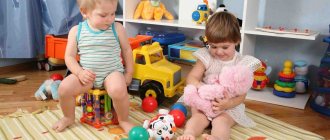Family education styles are different systems of educational influence of parents on children. Depending on them, children in the family can behave differently: obey their elders unquestioningly or be free in almost any decision, discuss their problems with their parents or hush them up, offer their own solutions to a particular situation or remain silent, knowing that everything no one will listen anyway. The behavior of parents can also be different: from rigid and unshakable frames and boundaries to absolute disinterest in the lives of their offspring.
The classification of family education styles and their characteristics are presented in the table:
| Parenting style | a brief description of |
| Authoritarian | Strict discipline, unquestioning submission of children to parents, strict rules and restrictions in relationships. The child does not have the right to choose, is not independent and does not know how to bear responsibility. |
| Liberal | Almost complete absence of any framework or boundaries, parents’ disinterest in the lives of their children, abdication of responsibility for their future |
| Guardian | Constant restrictions on the freedom of children by parents who most often have disturbing intentions and motives. The child is afraid of the world around him, lacks self-confidence, experiences anxiety and guilt. |
| Democratic | The basis is cooperation between children and parents. Adults are fair, restrained and consistent, demonstrate their love to children and know how to set flexible boundaries. Children learn to be independent and responsible, have the right to choose and freedom of voice, but within reasonable limits |
Depending on the parenting style, family relationships and the personality of children are formed. The democratic style is considered the most correct, but not every parent is ready and able to negotiate with their children, since they did not have the opportunity to learn this in their childhood. Raised in authoritarian or overprotective families, they subconsciously build the same relationships with their own children. Diagnosis of family parenting style can be carried out by a psychologist or teacher with the help of conversations and special testing.
Parenting styles in the family (psychological portrait)
Let's together recreate the psychological portraits of this or that parenting style, and you will determine in what conditions you yourself grew up, and what you now use in your upbringing as a parent.
Strict rules - authoritarian approach
Often parents treat their children with great severity, punishing them for the slightest mistakes. The instructions of the mother and father must be strictly followed. The child's point of view is not taken into account. Children are punished for bad behavior without any explanation. The dictatorial model of upbringing presupposes extremely strict restrictions on the independence of children and a “cold” attitude towards them. Parents believe that this method will allow them to raise an obedient, responsible and efficient person. However, as a rule, the result does not meet expectations.
Using an authoritarian parenting style often has the following consequences:
- Children with a powerful inner core begin to actively rebel, quarrel with their suppressive parents, and strive for independence and freedom at any cost. As teenagers, they often fall into “bad” companies and run away from home, expressing their protest.
- A child with a weak character is afraid of his mother and father, and experiences a strong fear of punishment. In the future, such children become unsure of themselves, overly timid, joyless and withdrawn.
- Some follow the example of their parents and subsequently create families using a well-known parenting model.
Mom and dad who practice dictatorial style should understand that they cannot put pressure on the baby, they need to allow the child to be independent, then he will be able to express himself better.
The future lies in partnerships
It is much easier to build authoritarianism in a married couple than, through many difficulties, to try to create your own cozy home on the basis of mutual understanding and respect, equality and support.
A democratic family is the future of any developed community. According to statistics, in most developed countries the policy of creating such marital unions is positive.
As proof of the perfection of partnerships, it can be noted that democracy is characteristic of the urban population, and authoritarianism is characteristic of people in rural areas, where traditions are of paramount importance. And according to tradition, the husband is “in power” when the wife does all the housework and obeys (sometimes tolerates) her husband.
There are, of course, other types of family relationships, but democracy is objectively the best solution for consolidating the marital union in the 21st century.
Liberal model
This style is also called permissive. It is usually used in families where parents are overly indulgent. They do not forbid anything for children, do not impose any restrictions on them, and strive in every possible way to show how much they love them. A child who has been brought up this way often manifests himself in the following ways:
- does not deny himself anything;
- avoids physical and mental labor;
- demonstrates impulsiveness;
- shows aggression;
- has high self-esteem;
- likes to show off;
- characterized by increased conflict.
The liberal parenting style cannot be called the optimal model. Parents should understand that it is not suitable for everyone. The following options for personal development are possible:
- An independent, decisive and active person with normal self-esteem, distinguished by some detachment. He does not know what attachment is, avoids close relationships, cares exclusively about himself. This is a loner who prefers to keep people at a distance, not letting anyone too close.
- An antisocial personality who does not accept any social framework. Such a person knows no restrictions, he is sure that he can get away with anything. Often such people connect their lives with crime, do not keep their word and show irresponsibility.
To choose the optimal model, it is very important to take into account the natural inclinations of the baby. Psychologists still recommend spending more time with your son or daughter and introducing at least simple rules and responsibilities. Under no circumstances should the baby be allowed to remain without the slightest control.
Subtypes of partner family
Above we have given a description of an ideal union where equality comes first. There are also different interpretations of the partner family, which have a number of features.
1. Patriarchal democratic family.
The peculiarity of such a union is the dominant role of the husband in various matters. Such a family is built on the same principles: respect, patience, concessions. However, equality is already eroding.
At the same time, it would be wrong to consider such a family purely patriarchal. Although the man has the last word, he will still listen to his wife. There is no violence or other destructive processes that can appear in pure patriarchy.
2. Matriarchal democratic family.
In such a community, everything is the other way around: leadership is transferred into the hands of a woman. Democracy manifests itself in situations where a husband can still influence his wife’s decisions, and children have the right to express their opinions and be listened to by their mother.
Overprotective parents
Parents with increased anxiety transfer their feelings to the baby, all the time expecting that something bad might happen. They do their best to protect him from possible troubles by introducing numerous restrictions. The child is prohibited from communicating with “unfavorable” peers, going for walks in the evening, or playing sports.
This style can manifest itself in completely different ways. Sometimes these are attempts to “tie” the baby to yourself and control him all the time. Sometimes anxious adults are overly concerned about their child’s health. Some parents treat their child like a small child, even when he becomes a teenager.
The method of education greatly influences the situation in the family. Often, adults manage to take care of their children, protecting them from difficulties even when they are presented with homework or responsibilities around the house. Such an educational method ultimately leads to the following development options:
- A person is convinced of his own superiority over others. Since childhood, he has become accustomed to manipulating others and treats them with great distrust. At the same time, he makes high demands on people, not giving them the right to make mistakes and not taking into account their point of view.
- Not a self-sufficient person, prone to dependent behavior. A person who is unable to solve his problems on his own. He is helpless, uninitiative, and cannot make decisions without relying on someone else’s opinion.
Parents who have realized that they are prone to overprotection should not be upset or worried about this. It is better for them to listen to some recommendations from experts. Psychologists advise anxious adults:
- Find some middle ground. All children need attention and care, but there is no need to overdo it either.
- Do not try to solve all of your child’s problems. It is better to give him valuable advice and help him overcome the difficulties that have arisen.
- Do not interfere with the interaction of your son or daughter with peers, do not limit the child’s communication to just one family;
- Accustom your child to discipline, but do not prevent him from showing independence.
What is family?
From a specialized dictionary, a family is a small social group whose members are related by marriage or blood, and are also interested in organizing cohabitation and mutual assistance.
If we compare our society with a whole organism, the family in it will be a separate cell. The proper functioning of the entire mechanism depends on these “cells.” Therefore, the family is a unit of society, the well-being of which directly affects the present and future.
Chaotic and indifferent style
In the case of a chaotic style, parents have different opinions regarding the parenting model. Each family member has their own point of view and considers it the only correct one. Often the mother experiences emotional swings. In such situations, children become uncontrollable and do not take into account parental demands. They suffer from imbalance and do not feel protected. They want to somehow organize the world around them. As adults, they are usually characterized by irresponsibility and childishness.
An indifferent approach to education assumes the absence of any control on the part of adults. The same goes for the relationships themselves. Parents do not interact with their children in any way, do not engage with them. Either they work too much or they don't care what their children turn out to be. Everyone is busy with their own personal problems. This behavior causes the development of a negative self-esteem in the child, who feels unimportant and useless.
The most favorable method
The democratic type of education is considered the most favorable for the development of the future generation. Children get the opportunity to learn to be independent and at the same time disciplined and responsible. The child has his own responsibilities, but his interests are not infringed.
Adults respect the child’s point of view and take him into account when making important decisions. They are aware of the age-related characteristics of the baby and do not expect anything impossible from him. If necessary, parents justify their own requirements and are always ready to hear the child’s arguments. They do not take away his right to choose and at the same time impose a certain responsibility.
The child does not suffer from excessive guardianship; major conflicts do not occur in such families. Children listen to mom and dad, who explain to them what can and cannot be done.
The democratic style of upbringing in the family is characterized by such a feature as moderation. Kids do not show excessive aggression, but at the same time they have excellent prerequisites for becoming leaders. They are able to control others, but they themselves cannot be manipulated. This approach is also called the authoritative parenting style.
Typically, such children are morally stable, purposeful, open and sociable, they easily adapt to social life. However, it is worth mentioning those traits that are observed only in a small part of the offspring in the families described. This is altruism, sensitivity, empathy.
An authoritative style implies respect for the attitudes of the little person. It is important for parents to learn to be friends with the baby without losing their own authority in his eyes, so that the baby can trust them in the future.
Advantages and disadvantages
As you can see for yourself, an authoritative style of family education is the most harmonious for a still small growing individual. It allows you to reveal her characteristics, talents and become more mature, conscious, and with self-esteem.
The downside is that adults who choose this particular path need to make a lot of effort to develop. Deal with your own limitations and be a role model.
And there are not always resources to seek a compromise and offer cooperation. Instead of the usual order, which should be strictly followed because “I said so.”
Eidemiller's types of abnormal parenting
In his classification, E. G. Eidemiller relied on such factors as the emotional presence of parents in the lives of children, the quality of care provided and the level of control, taking into account the age of the children and their personal characteristics. The author identifies the following abnormal parenting styles:
- Hypoprotection - care is minimal, sometimes the child is left without any supervision at all. Children are sorely lacking in attention. In some cases, control is formal, but in reality the child does not receive any care or there is so little care that the baby constantly experiences a lack of attention.
- Pandering hyperprotection - the baby is a beacon. Adults fulfill his every whim literally in the blink of an eye. As a result of this attitude, a person is formed who strives to take a leadership position, but does not want to do anything for this.
- Dominant hyperprotection - the baby is the center of attention of the mother and father, who always forbid him something. The little man has no opportunity to show his independence and learn to take responsibility for his actions.
- Increased moral responsibility - parents make impossible demands on the child that do not correspond to his age. For example, the child is given responsibility for the life and health of other family members, or unconditional sincerity is expected from him. As a rule, such adults ignore the child’s personal interests and do not understand his true needs.
- Emotional rejection - parents take out accumulated negativity on their children, treat them cruelly, disrespect them, and are constantly dissatisfied with something. The child’s needs are not taken into account; the baby constantly hears that someone is better than him. Sometimes adults try to hide their true attitude towards the baby, trying to compensate for the lack of love with excessive care, but at the same time they still remain emotionally unavailable and cold. This is the case when the baby is a burden.
Liberal style: features, consequences, recommendations
The liberal model of education is somewhat similar to the indifferent one and the opposite of the authoritarian one. When deciding to follow this parenting style, parents opt for warm feelings and a friendly atmosphere, abandoning discipline and rigidity. Relationships in such a family are more like friendships than the clichéd and generally accepted connections between parents and children.
Adults make minimal demands on children, who are often extremely loyal and “humane”, always open to communication on any topic, support the child in difficult life situations, keeping his nervous system calm, but at the same time practically do not pay attention to his academic performance .
It would seem that this is the ideal model of education, but even here harmful consequences are revealed. Children raised in a liberal system grow up either as those who are not accustomed to living within the framework of society and obeying any rules, norms, or irresponsible ones; or a little aloof, as if lost in society, but an extremely self-confident person with high self-esteem. An egoist who absolutely does not know how to help and support other people. It will be easier for such people to live alone, devoting their entire lives to work.
Characteristic features of the style:
- Parents are very sensitive and interested in their children, with excessive levels of concern for them.
- Parents do not allow their child to rehearse answers on their own in order to avoid mistakes and harm themselves.
- Everything is simplified, children's responsibilities are limited; As he grows, he is not given independence.
- Parents cannot say no to their child.
Consequences of personality development of children raised in this style:
- Children do not acquire adequate habits because their parents do everything.
- Low level of self-control: If the problems they face are not important, they do well, but in difficult situations they are not very prepared.
- Low tolerance for disappointment, often leading to angry reactions.
- High likelihood of resorting to evasion in the face of difficulties (drugs, alcohol).
- Children are more creative than those educated in other styles, but because they are not accustomed to the discipline required to capture this creativity, they cannot adequately express it.
- They show little sympathy and are despotic.
What do psychologists say? They advise combining this model with an authoritative one, or not using the liberal style at all, because in itself it is not optimal and cannot bring any benefit to the child. If parents notice the similarities between this system and their own and do not want to allow the same consequences, then they need to try to take more interest in the child’s education, slowly enter his life, introducing basic rules of behavior and establishing a daily routine for the child. The main task of adults should be to establish relationships that will not deprive parents of due authority in the eyes of the child.
Absolute harmony
Such upbringing involves accepting the baby as he is. Adults do not impose their vision of life on him and do not strive to correct minor shortcomings. There are prohibitions in the family that apply to all members, but there are few such restrictions.
Children's needs are satisfied within reasonable limits, which does not lead to infringement of the interests of elders. The child chooses his own development path. Adults do not put pressure on him and do not force him to attend clubs that the baby does not like, while encouraging the baby’s independence. If the need arises, they give advice to the baby.
Thus, there are different styles of parenting in the family. If parents want to raise a self-sufficient person with healthy self-esteem, they should learn to optimally combine democracy and control, without overdoing it. A wise and empathic parent always feels which educational method is best to use for a small person with specific natural inclinations.
Family functions
It doesn’t matter what goals a married couple pursues or what type of family relationship they want to build. Forming a family involves the emergence of certain functions, including:
- Birth of children.
- Interaction with children and development of motherhood/fatherhood skills.
- Development of economic relations, satisfaction of the material needs of all family members.
- A source of love, respect and psychological protection.
- Communication with family members, mental relaxation.
- Primary socialization.
- Intellectual and physical relaxation.
In real life, it is not always possible to see the fulfillment of all the listed points, but a “standard” example of the presence of all functions is a democratic family. What it is? What features does this type of marital union have?











